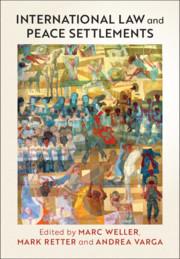Description
International Law and Peace Settlements
Coordinators: Weller Marc, Retter Mark, Varga Andrea
Provides a comprehensive assessment of the relationship between international law and peace settlement practice over core settlement issues.
Language: English
Subject for International Law and Peace Settlements:
Prix indicatif 297,82 €
Disponible chez l'éditeur (délai d'approvisionnement : 14 jours).
Add to cart
Publication date: 02-2021
752 p. · 18.2x25.8 cm · Relié
752 p. · 18.2x25.8 cm · Relié
Résumé
/li>Sommaire
/li>Biographie
/li>
International Law and Peace Settlements provides a systematic and comprehensive assessment of the relationship between international law and peace settlement practice across core settlement issues, e.g. transitional justice, human rights, refugees, self-determination, power-sharing, and wealth-sharing. The contributions address key cross-cutting questions on the legal status of peace agreements, the potential for developing international law, and the role of key actors ? such as non-state armed groups, third-state witnesses and guarantors, and the UN Security Council ? in the legalisation and internationalisation of settlement commitments. In recent years, significant scholarly work has examined facets of the relationship between international law and peace settlements, through concepts such as jus post bellum and lex pacificatoria. International Law and Peace Settlements drives forward the debate on the legalisation and internationalisation of peace agreements with diverse contributions from leading academics and practitioners in international law and conflict resolution.
1. Framing the relationship between international law and peace settlements Marc Weller, Mark Retter and Andrea Varga; Part I. Historical Dimensions to Peace Settlement Practice: 2. Ancient peace treaties and international law Larry May; 3. The lore and laws of peace-making in early-modern and 19th-century European peace treaties Randall Lesaffer; 4. The Treaty of Westphalia as peace settlement and political concept: from a German security system to the constitution of international law Christoph Kampmann; 5. The boundaries of peace-making: British imperial encounters, c.1700–1900 Megan Donaldson; Part II. Peace Agreements as Legal Instruments: 6. The interpretation and implementation of peace agreements Laura Edwards and Jonathan Worboys; 7. The afterlife of peace agreements Mats Berdal; 8. Interactions between peace agreements and international law Philipp Kastner; Part III. Key Actors and the Role of International Law: 9. Non-state armed groups and peace agreements: examining legal capacity and the emergence of customary rules Daragh Murray; 10. Witnesses and guarantors: third-party obligations and the internationalisation of peace agreements Andrea Varga; 11. The Security Council, peace-making and peace settlement: between executive and pragmatic Nigel D. White; 12. Peace-making, peace agreements and peacekeeping: strategic, operational and normative issues Scott Sheeran and Catherine Kent; Part IV. Representation, Sovereignty and Governance: 13. Inclusion and women in peace processes Tiina Pajuste; 14. National dialogues and the resolution of violent conflicts Katia Papagianni; 15. Advancing peaceful settlement and democratisation: the doubtful usefulness of international electoral norms Brad R. Roth; 16. Power sharing and peace settlements Marie-Joëlle Zahar; 17. Resolving religious conflicts through peace agreements Isak Svensson; 18. Self-determination and peace-making Marc Weller; 19. Peace agreements and territorial change Marcelo Kohen and Mamadou Hébié; Part V. Economic Aspects of Peace Settlements: 20. Political economy, international law and peace agreements Andrew Ladley and Achim Wennmann; 21. Balancing national ownership with international intervention: combating illegal exploitation of natural resources through peace processes Daniëlla Dam-de Jong; 22. Sharing resource wealth in conflict settlements George Anderson; 23. Overcoming violence in maritime conflicts with provisional arrangements: a legal tool for conflict resolution Christian Schultheiss; 24. Financing peace through law? Financial woes for a law of peace-making Mark Retter; Part VI. Humanitarian Obligations and Human Rights: 25. Negotiating the international legal fate of detainees Jake Rylatt and Mark Retter; 26. Accountability: essential for peace or an obstacle? Renée Jeffery; 27. The return of people and property Anneke Smit; 28. Peace settlements and human rights Jenna Sapiano; 29. Developments in peace settlement practice and international law Marc Weller.
Marc Weller is Professor and Chair of International Law and International Constitutional Studies, Department of Politics and International Studies, University of Cambridge. He has served as UN Senior Mediation Expert and is a highly experienced international dispute settlement professional. Certified and accredited as a professional mediator, he was elected a Fellow of the Chartered Institute of Arbitrators, and is a qualified barrister at Doughty Street Chambers in London. As principal investigator for the ESRC-funded Legal Tools of Peace-making project, of which this book is one output, he developed the Language of Peace database in collaboration with the UN.
Mark Retter is a former Gates Cambridge Scholar and Research Associate for the Legal Tools for Peace-making project at the University of Cambridge, which developed the Language of Peace database. He has published papers on jus cogens, Fuller's procedural natural law and MacIntyre's human rights scepticism, and is currently working on a monograph, Human Rights After Virtue (forthcoming, CUP), and on the Handbook on Natural Law and Human Rights (forthcoming, CUP).
Andrea Varga is a former Research Associate for the ESRC-funded Legal Tools for Peace-making project at the University of Cambridge, where she oversaw the development of the Language of Peace database. Her research interests include state responsibility, human rights obligations of non-state actors, and the influence of parties' pleadings on international jurisprudence.
Mark Retter is a former Gates Cambridge Scholar and Research Associate for the Legal Tools for Peace-making project at the University of Cambridge, which developed the Language of Peace database. He has published papers on jus cogens, Fuller's procedural natural law and MacIntyre's human rights scepticism, and is currently working on a monograph, Human Rights After Virtue (forthcoming, CUP), and on the Handbook on Natural Law and Human Rights (forthcoming, CUP).
Andrea Varga is a former Research Associate for the ESRC-funded Legal Tools for Peace-making project at the University of Cambridge, where she oversaw the development of the Language of Peace database. Her research interests include state responsibility, human rights obligations of non-state actors, and the influence of parties' pleadings on international jurisprudence.
© 2024 LAVOISIER S.A.S.




